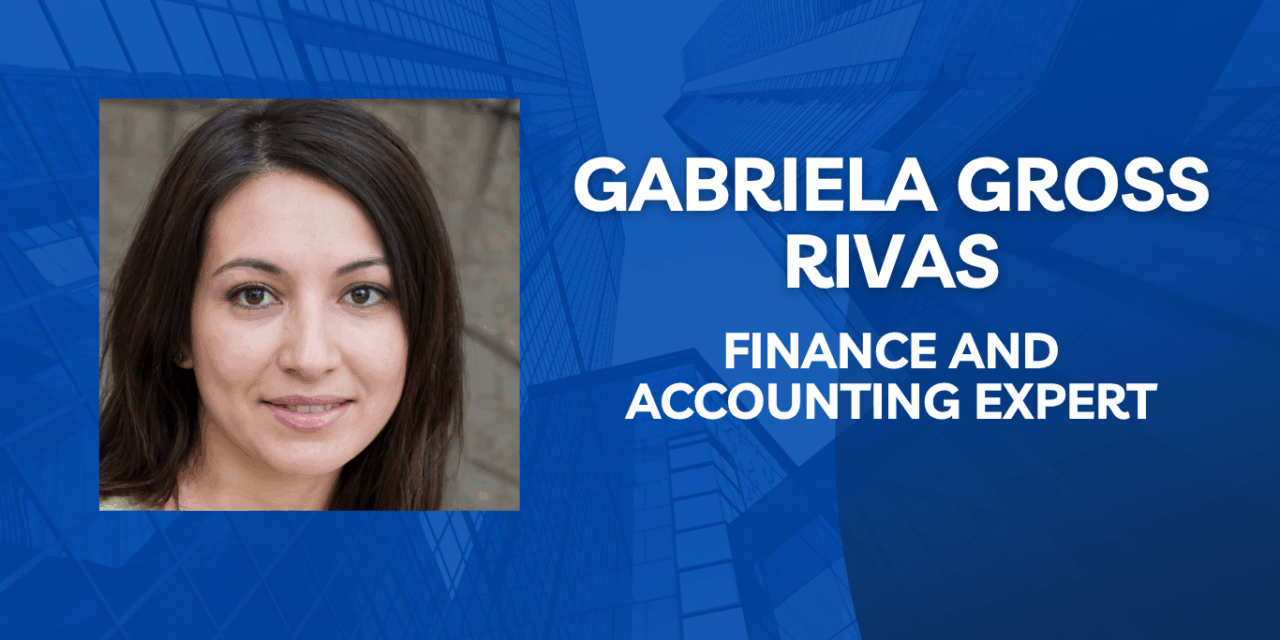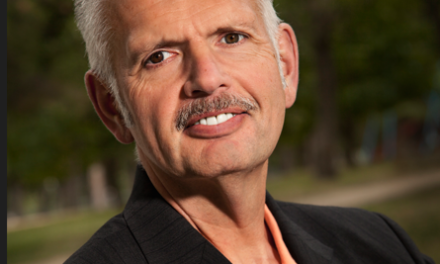Gabriela Gross Rivas is an accomplished Certified Public Accountant (CPA) with over eight years of experience in the accounting and finance sectors. After earning her Bachelor’s degree in Accounting from Pace University, Gabriela began her career at a leading firm before branching out into her own consultancy. Known for her expertise in tax planning, auditing, and financial reporting, Gabriela has built a reputation for providing her clients with reliable, high-quality financial advice. Beyond her technical skills, Gabriela is deeply committed to community service and professional development, balancing her career with athletic pursuits and ongoing efforts to inspire others in both her personal and professional lives.
As a dynamic force in the field of accounting, Gabriela is driven by a passion for helping individuals and businesses achieve financial clarity and success. Her experience spans a wide range of industries, with a strong focus on ensuring compliance and enhancing financial strategy for her clients. Gabriela is actively involved in various professional organizations and community outreach initiatives, offering her expertise to nonprofit organizations and mentoring young accountants. Whether working with small startups or large corporations, Gabriela’s commitment to excellence and her comprehensive approach to financial management make her a trusted advisor in her field.
What inspired you to pursue a career in accounting?
My decision to pursue accounting came from a deep-seated love for problem-solving and organization. As a child, I was always fascinated by how numbers and systems fit together in a way that made things work more efficiently. I found myself naturally drawn to managing budgets and helping others with financial decisions, even at a young age. In high school, I started taking accounting courses and realized this could be the perfect profession for me. It offered the opportunity to dive deep into numbers while also helping people and businesses achieve financial clarity. I wanted to be able to provide valuable advice that could make a real difference in someone’s financial journey.
As I continued through college, I grew even more passionate about the profession. I was particularly interested in the way accountants provide a foundation for businesses and individuals to make informed decisions about their finances. The satisfaction of being able to help someone understand their financial position and guide them toward better decisions was extremely rewarding. Accounting gives me the opportunity to take complex financial data and break it down into meaningful insights, and this aspect of the profession is what truly inspired me to pursue it as a lifelong career.
How do you balance your professional achievements with your personal interests?
Balancing my professional life with personal interests has always been a priority for me, and it’s something I’ve learned to manage over time. Early in my career, I found it challenging to juggle long hours at work with maintaining a healthy work-life balance. However, I quickly realized that in order to perform at my best in my career, I needed to make time for things that brought me joy and relaxation outside of work. I started scheduling personal time for physical activities, such as running and yoga, which helped me clear my mind and recharge my energy. Exercise became a vital part of my routine that kept me grounded, allowing me to stay focused and productive in my professional life.
In addition to exercise, I make it a point to carve out time for family and community involvement. I’ve found that engaging with others and contributing to my community not only helps me feel fulfilled but also provides a sense of balance. Being involved in local nonprofit organizations or mentoring young professionals allows me to give back while also continuing to grow personally and professionally. Having a well-rounded life, where I make time for my passions, hobbies, and family, keeps me motivated and energized both at work and in my personal endeavors.
What role does community involvement play in your life, and how do you integrate it into your work?
Community involvement is incredibly important to me, both personally and professionally. I believe that being part of a community allows us to grow and learn from others while also contributing positively to society. Over the years, I’ve volunteered my time and expertise with several nonprofit organizations that focus on financial literacy and economic empowerment. As an accountant, I understand the importance of having a solid financial foundation, and I want to help those who may not have access to professional financial advice. By offering pro bono consulting services, I’ve been able to give back and help organizations manage their finances in ways that allow them to focus on their missions.
Additionally, I try to integrate my community involvement into my work by encouraging my clients to consider their social responsibility. I believe that businesses can and should have a positive impact on their communities. By helping my clients understand the importance of community engagement and guiding them toward socially responsible practices, I’m able to combine my professional expertise with my personal values. This integration of work and community not only benefits the people and organizations I work with but also helps me stay grounded and focused on the broader purpose of what I do.
How do you stay updated with changes in tax laws and accounting standards?
Staying updated with changes in tax laws and accounting standards is essential in my field, and I take it very seriously. The financial world is constantly evolving, and as an accountant, it’s my responsibility to stay ahead of any regulatory changes that may affect my clients. To ensure I’m always on top of the latest updates, I attend several professional development seminars and conferences throughout the year. These events provide valuable insights from experts in the field and allow me to network with other professionals, which can be beneficial for sharing information and best practices.
I also subscribe to industry-leading journals and publications, such as the Journal of Accountancy and the Tax Advisor, which keep me informed about the latest tax laws, accounting standards, and trends in the profession. Additionally, I’m part of a number of online accounting communities and forums where professionals from around the world discuss changes in the field. By staying connected with other experts and engaging in ongoing learning, I ensure that I can offer the best and most up-to-date advice to my clients.
What is the most rewarding part of being a CPA for you?
For me, the most rewarding part of being a CPA is seeing the direct impact that my work has on my clients. It’s incredibly fulfilling to help businesses and individuals understand their financial situation and provide them with the tools they need to make informed decisions. Whether it’s helping a small business owner manage their taxes effectively or guiding an individual through a complex financial decision, the satisfaction of knowing that my expertise is making a difference is truly rewarding. It’s a feeling that drives me to continue improving and learning in my profession.
Another rewarding aspect is the opportunity to mentor and inspire the next generation of accountants. I’m deeply passionate about sharing my knowledge with young professionals and encouraging them to pursue careers in accounting. By helping others navigate the challenges of the profession, I feel like I’m giving back to the industry that has given me so much. It’s gratifying to see young accountants grow in their careers and know that I played a part in their development.
Can you tell us about a particularly challenging project you’ve worked on and how you overcame it?
One of the most challenging projects I worked on was assisting a large nonprofit organization with their financial audit. The organization had a complex financial structure, with multiple streams of funding and a diverse array of donors. The challenge was to ensure that all their financial records were in order and compliant with the relevant regulations. There were some discrepancies in their financial reporting that needed to be addressed, and it required a meticulous review of every transaction. The project was high-stakes, as the audit’s outcome would directly impact their ability to continue receiving funding and support from their donors.
To overcome these challenges, I organized a team to go through the records and identify the issues. We conducted thorough reconciliations and worked closely with the nonprofit’s internal staff to gather missing information. By breaking the project down into manageable steps and collaborating with others, we were able to address the discrepancies and prepare the necessary documentation for a successful audit. In the end, the organization passed the audit, and the experience taught me the importance of teamwork, attention to detail, and staying calm under pressure.
What are some of the skills you believe are essential for an accountant to be successful?
I believe that a successful accountant must possess a combination of technical and interpersonal skills. On the technical side, a deep understanding of accounting principles, tax laws, and financial reporting is essential. Accountants need to be highly organized, detail-oriented, and have strong analytical skills to interpret complex financial data. Additionally, familiarity with accounting software and technology tools is increasingly important in today’s digital world. Staying up-to-date with advancements in accounting software and automation is key to remaining competitive and efficient in the profession.
On the interpersonal side, effective communication is crucial. Accountants must be able to explain complex financial concepts to clients in a clear and accessible way. Building strong relationships with clients is also important, as trust and understanding are the foundations of any successful accounting practice. Finally, adaptability is essential, as the accounting profession is always evolving, and accountants must be able to adjust to new regulations, technologies, and client needs. These skills combined allow an accountant to thrive in the profession.
How do you see the future of the accounting profession evolving in the next decade?
The future of accounting will be heavily influenced by technology and automation. In the next decade, I expect to see more routine tasks being automated, such as bookkeeping, tax filing, and financial reporting. This will allow accountants to focus on more strategic roles, such as advising clients on financial decisions and offering in-depth analysis. The rise of artificial intelligence (AI) and machine learning will continue to transform how we work with financial data, enabling us to make more accurate predictions and offer more customized advice to clients.
However, while technology will play a significant role, the human element will still be essential. Accounting is about more than just crunching numbers—it’s about understanding the context, making ethical decisions, and offering personalized guidance. I believe the profession will shift toward a more advisory role, where accountants act as trusted consultants who use technology to enhance their advice but still maintain that crucial human touch. The future is bright for accountants who can blend technological expertise with strong interpersonal skills.
What advice would you give to young people interested in pursuing a career in accounting?
My advice would be to stay curious, work hard, and never stop learning. Accounting is a field that requires continuous education and adaptation to new trends, technologies, and regulations. Whether you’re just starting out or already in the profession, it’s important to stay committed to personal growth and seek out opportunities to learn. I also recommend gaining hands-on experience early in your career, whether through internships or part-time jobs. This will give you invaluable insights into the profession and help you build a strong network of contacts within the industry.
Networking is also essential in accounting. Connect with mentors, attend professional events, and stay involved in industry organizations. Having a strong professional network can open doors to new opportunities and provide you with resources and support as you advance in your career. Finally, be open to new challenges and never be afraid to step out of your comfort zone. Accounting is a diverse field with many different career paths, so don’t be afraid to explore and find the niche that excites you.




